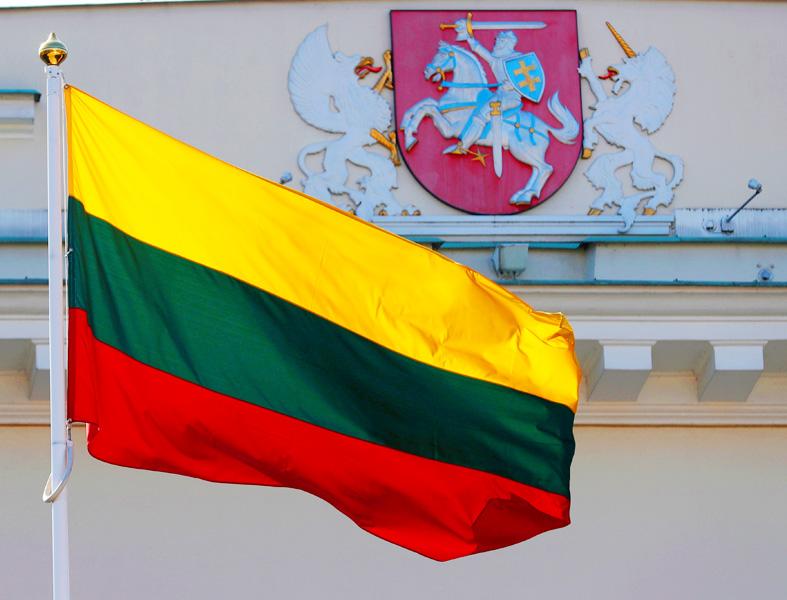Beijing has put itself into an impossible position with its response to Lithuania allowing the establishment of a Taiwanese representative office in Vilnius, a Taiwanese researcher said on Saturday.
China on Tuesday recalled its ambassador from Vilnius and demanded that the Lithuanian ambassador leave China after Lithuania agreed to the establishment of the office.
The move has left Beijing with no room to maneuver on the issue, Taiwan Thinktank consultant Lai I-chung (賴怡忠) said.

Photo: Reuters
Lithuania values its relationships with the US and other NATO countries, so worsening US-China relations had affected Lithuania’s attitude toward China, he said.
Lithuania in 2004 joined the EU and NATO, and was reminded of the threat of hostile states in 2014 when Russia annexed Crimea, he said.
Lithuania in 2016 also joined the NATO initiative Enhanced Forward Presence, which deployed multinational battalion groups to countries in central and northern Europe deemed to be most at risk of Russian attack or invasion.
The Taiwanese office that has been planned for Vilnius and the Lithuanian office planned for Taipei do not represent the establishment of formal relations between the two countries, Lai said.
“Other EU countries have had similar interactions with Taiwan in the past without issue,” he said.
“However, Beijing’s hatred for Taiwan’s current administration, as well as its concern that Lithuania and Taiwan might establish formal relations ... pushed it to act this time,” he added.
Lai said that China exported 1.2 billion euros (US$1.42 billion) worth of goods to Lithuania last year, and imported 300 million euros of goods in return.
Given the relatively small amount of trade between the countries, economic sanctions would be ineffective, so Beijing opted to withdraw its ambassador instead, he said.
“Also demanding the expulsion of the Lithuanian ambassador was meant as a threat of potentially severed relations, but rather than be threatened, Lithuania might just resolve to establish formal ties with Taipei,” he said.
Lai said the “straw that broke the camel’s back” in relations was China’s response to Lithuanians voicing support for Hong Kong protestors in 2019.
At the time, the Chinese ambassador in Vilnius lodged a protest with the Lithuanian government, which put Lithuanians on guard about the country’s relationship with China, he said.
“Lithuania is different from a country like Poland, which tries to bridge two superpowers,” Institute for National Defense and Security Research member Lee Chun-yi (李俊毅) said. “Lithuania is next to Russia and is aware of the threat it poses, so it closely aligns itself with Western Europe.”
“Lithuania is the front line for the West,” he added.
Lithuania’s history of annexation by the Soviet Union has shaped its opposition to authoritarian governments, he said.

Taiwanese can file complaints with the Tourism Administration to report travel agencies if their activities caused termination of a person’s citizenship, Mainland Affairs Council Minister Chiu Chui-cheng (邱垂正) said yesterday, after a podcaster highlighted a case in which a person’s citizenship was canceled for receiving a single-use Chinese passport to enter Russia. The council is aware of incidents in which people who signed up through Chinese travel agencies for tours of Russia were told they could obtain Russian visas and fast-track border clearance, Chiu told reporters on the sidelines of an event in Taipei. However, the travel agencies actually applied

Japanese footwear brand Onitsuka Tiger today issued a public apology and said it has suspended an employee amid allegations that the staff member discriminated against a Vietnamese customer at its Taipei 101 store. Posting on the social media platform Threads yesterday, a user said that an employee at the store said that “those shoes are very expensive” when her friend, who is a migrant worker from Vietnam, asked for assistance. The employee then ignored her until she asked again, to which she replied: "We don't have a size 37." The post had amassed nearly 26,000 likes and 916 comments as of this

New measures aimed at making Taiwan more attractive to foreign professionals came into effect this month, the National Development Council said yesterday. Among the changes, international students at Taiwanese universities would be able to work in Taiwan without a work permit in the two years after they graduate, explainer materials provided by the council said. In addition, foreign nationals who graduated from one of the world’s top 200 universities within the past five years can also apply for a two-year open work permit. Previously, those graduates would have needed to apply for a work permit using point-based criteria or have a Taiwanese company

US President Donald Trump said "it’s up to" Chinese President Xi Jinping (習近平) what China does on Taiwan, but that he would be "very unhappy" with a change in the "status quo," the New York Times said in an interview published yesterday. Xi "considers it to be a part of China, and that’s up to him what he’s going to be doing," Trump told the newspaper on Wednesday. "But I’ve expressed to him that I would be very unhappy if he did that, and I don’t think he’ll do that," he added. "I hope he doesn’t do that." Trump made the comments in